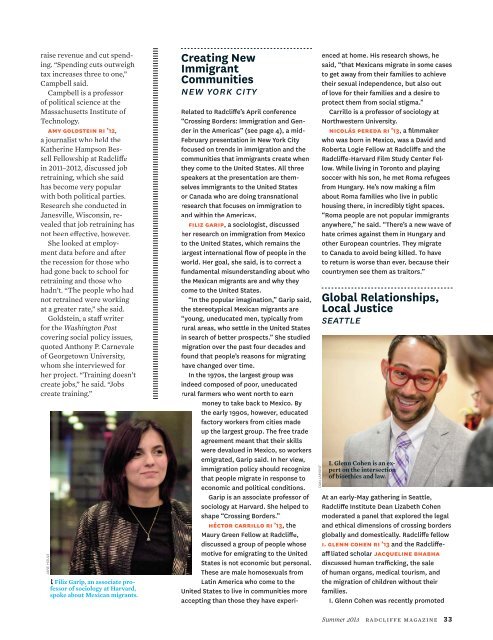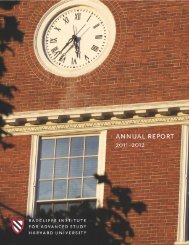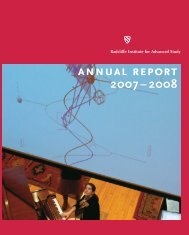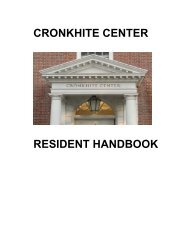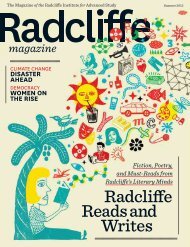Download - Radcliffe Institute for Advanced Study - Harvard University
Download - Radcliffe Institute for Advanced Study - Harvard University
Download - Radcliffe Institute for Advanced Study - Harvard University
Create successful ePaper yourself
Turn your PDF publications into a flip-book with our unique Google optimized e-Paper software.
aise revenue and cut spending.<br />
“Spending cuts outweigh<br />
tax increases three to one,”<br />
Campbell said.<br />
Campbell is a professor<br />
of political science at the<br />
Massachusetts <strong>Institute</strong> of<br />
Technology.<br />
amy goldstein ri ’12,<br />
a journalist who held the<br />
Katherine Hampson Bessell<br />
Fellowship at <strong>Radcliffe</strong><br />
in 2011–2012, discussed job<br />
retraining, which she said<br />
has become very popular<br />
with both political parties.<br />
Research she conducted in<br />
Janesville, Wisconsin, revealed<br />
that job retraining has<br />
not been effective, however.<br />
She looked at employment<br />
data be<strong>for</strong>e and after<br />
the recession <strong>for</strong> those who<br />
had gone back to school <strong>for</strong><br />
retraining and those who<br />
hadn’t. “The people who had<br />
not retrained were working<br />
at a greater rate,” she said.<br />
Goldstein, a staff writer<br />
<strong>for</strong> the Washington Post<br />
covering social policy issues,<br />
quoted Anthony P. Carnevale<br />
of Georgetown <strong>University</strong>,<br />
whom she interviewed <strong>for</strong><br />
her project. “Training doesn’t<br />
create jobs,” he said. “Jobs<br />
create training.”<br />
JANE HOULE<br />
3 Filiz Garip, an associate professor<br />
of sociology at <strong>Harvard</strong>,<br />
spoke about Mexican migrants.<br />
Creating New<br />
Immigrant<br />
Communities<br />
new york city<br />
Related to <strong>Radcliffe</strong>’s April conference<br />
“Crossing Borders: Immigration and Gender<br />
in the Americas” (see page 4), a mid-<br />
February presentation in New York City<br />
focused on trends in immigration and the<br />
communities that immigrants create when<br />
they come to the United States. All three<br />
speakers at the presentation are themselves<br />
immigrants to the United States<br />
or Canada who are doing transnational<br />
research that focuses on immigration to<br />
and within the Americas.<br />
filiz garip, a sociologist, discussed<br />
her research on immigration from Mexico<br />
to the United States, which remains the<br />
largest international flow of people in the<br />
world. Her goal, she said, is to correct a<br />
fundamental misunderstanding about who<br />
the Mexican migrants are and why they<br />
come to the United States.<br />
“In the popular imagination,” Garip said,<br />
the stereotypical Mexican migrants are<br />
“young, uneducated men, typically from<br />
rural areas, who settle in the United States<br />
in search of better prospects.” She studied<br />
migration over the past four decades and<br />
found that people’s reasons <strong>for</strong> migrating<br />
have changed over time.<br />
In the 1970s, the largest group was<br />
indeed composed of poor, uneducated<br />
rural farmers who went north to earn<br />
money to take back to Mexico. By<br />
the early 1990s, however, educated<br />
factory workers from cities made<br />
up the largest group. The free trade<br />
agreement meant that their skills<br />
were devalued in Mexico, so workers<br />
emigrated, Garip said. In her view,<br />
immigration policy should recognize<br />
that people migrate in response to<br />
economic and political conditions.<br />
Garip is an associate professor of<br />
sociology at <strong>Harvard</strong>. She helped to<br />
shape “Crossing Borders.”<br />
héctor carrillo ri ’13, the<br />
Maury Green Fellow at <strong>Radcliffe</strong>,<br />
discussed a group of people whose<br />
motive <strong>for</strong> emigrating to the United<br />
States is not economic but personal.<br />
These are male homosexuals from<br />
Latin America who come to the<br />
United States to live in communities more<br />
accepting than those they have experienced<br />
at home. His research shows, he<br />
said, “that Mexicans migrate in some cases<br />
to get away from their families to achieve<br />
their sexual independence, but also out<br />
of love <strong>for</strong> their families and a desire to<br />
protect them from social stigma.”<br />
Carrillo is a professor of sociology at<br />
Northwestern <strong>University</strong>.<br />
nicolás pereda ri ’13, a filmmaker<br />
who was born in Mexico, was a David and<br />
Roberta Logie Fellow at <strong>Radcliffe</strong> and the<br />
<strong>Radcliffe</strong>-<strong>Harvard</strong> Film <strong>Study</strong> Center Fel-<br />
low. While living in Toronto and playing<br />
soccer with his son, he met Roma refugees<br />
from Hungary. He’s now making a film<br />
about Roma families who live in public<br />
housing there, in incredibly tight spaces.<br />
“Roma people are not popular immigrants<br />
anywhere,” he said. “There’s a new wave of<br />
hate crimes against them in Hungary and<br />
other European countries. They migrate<br />
to Canada to avoid being killed. To have<br />
to return is worse than ever, because their<br />
countrymen see them as traitors.”<br />
DAN LAMONT<br />
Global Relationships,<br />
Local Justice<br />
seattle<br />
I. Glenn Cohen is an expert<br />
on the intersection<br />
of bioethics and law.<br />
At an early-May gathering in Seattle,<br />
<strong>Radcliffe</strong> <strong>Institute</strong> Dean Lizabeth Cohen<br />
moderated a panel that explored the legal<br />
and ethical dimensions of crossing borders<br />
globally and domestically. <strong>Radcliffe</strong> fellow<br />
i. glenn cohen ri ’13 and the <strong>Radcliffe</strong>-<br />
affiliated scholar jacqueline bhabha<br />
discussed human trafficking, the sale<br />
of human organs, medical tourism, and<br />
the migration of children without their<br />
families.<br />
I. Glenn Cohen was recently promoted<br />
Summer 2013 radcliffe magazine 33


